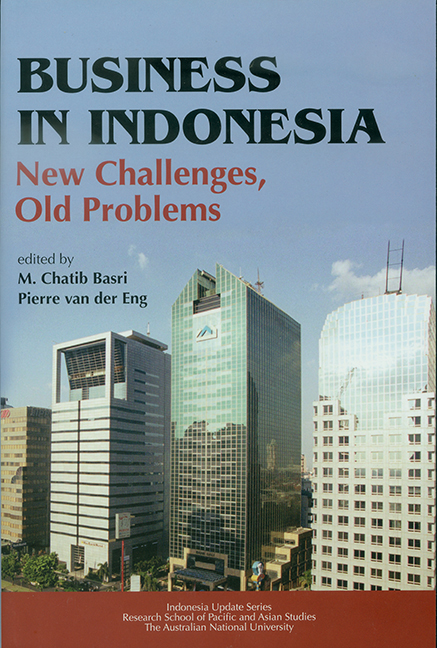Book contents
- Frontmatter
- Contents
- Tables
- Figures
- Contributors
- Acknowledgments
- Glossary
- 1 Business in Indonesia: Old Problems and New Challenges
- PART I Political and Economic Developments
- PART II Overview of the Business Environment
- 4 A New Political Economy? Politics, Ethnicity and Business in Indonesia
- 5 Investment Prospects: A View from the Private Sector
- PART III Foreign Investment and Trade
- PART IV Key Issues in the Business Environment
- References
- Index
- Indonesia Update Series
4 - A New Political Economy? Politics, Ethnicity and Business in Indonesia
from PART II - Overview of the Business Environment
Published online by Cambridge University Press: 21 October 2015
- Frontmatter
- Contents
- Tables
- Figures
- Contributors
- Acknowledgments
- Glossary
- 1 Business in Indonesia: Old Problems and New Challenges
- PART I Political and Economic Developments
- PART II Overview of the Business Environment
- 4 A New Political Economy? Politics, Ethnicity and Business in Indonesia
- 5 Investment Prospects: A View from the Private Sector
- PART III Foreign Investment and Trade
- PART IV Key Issues in the Business Environment
- References
- Index
- Indonesia Update Series
Summary
Nearly six years after the fall of Soeharto, a casual visitor to Indonesia may well find it unrecognisable. Long ruled by a general, the country is now run by a housewife. Long one of the most centralised countries in Asia, it is now one of the most decentralised, with newly empowered governors and district heads (bupati) in an unseemly rush to set up everything from airlines to Disneylandstyle theme parks. Where once the press was a poodle, it is now a pitbull. How many of us can imagine a newspaper headline from the 1970s, 1980s or 1990s announcing that President Soeharto's mouth ‘smells of diesel fuel’, as Rakyat Merdeka said of President Megawati Sukarnoputri in 2002?
Among the most profound differences between the old Indonesia and the new is a resurgence of ethnic and religious identity. At times this has found peaceful expression, as in the return of the dragon dance to public view on Chinese New Year. Often, it has taken a darker form, as attested to by countless stories from Ambon, Poso and Sampit, and, you could argue, Aceh and Papua as well. Indeed, the combination of economic stagnation and ethnic strife has been such that even today a line on the Jakarta Post's home page asks whether Indonesia can survive until 2050.
Yet, for all the dizzying change, one important aspect of Indonesia's political economy remains largely the same. The relationship between ethnicity and business – forged under Dutch rule and hardened under Soeharto – has not been shaken. The military may have lost much of its clout, the regions may have found new resources, and the press and civil society may have new teeth. But when viewed through the narrow prism of ethnicity, Indonesia's private economy remains much the same – dominated by the minority ethnic Chinese community, with indigenous or pribumi ownership of major corporations more the exception than the rule.
This dominance is one of those facts of Indonesian life we tend to take for granted, as unchanging as traffic jams on Jalan Sudirman or the smell of clove cigarettes in elevators. Yet, just a few years ago, in the chaos that followed Soeharto's downfall, most seasoned Indonesia watchers would not have imagined that things would turn out this way. In 1999 Adam Schwarz wrote:
… the political transformation underway in Indonesia will almost surely result in a less favourable climate for ethnic-Chinese businesses.
- Type
- Chapter
- Information
- Business in IndonesiaNew Challenges, Old Problems, pp. 61 - 71Publisher: ISEAS–Yusof Ishak InstitutePrint publication year: 2004



